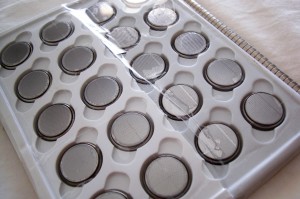Button Batteries Sending More Children To ER: Study
May 21st, 2012
 The number of children brought to the emergency room due to accidental swallowing button batteries has doubled over the last twenty years, a new study revealed.
The number of children brought to the emergency room due to accidental swallowing button batteries has doubled over the last twenty years, a new study revealed.
Button batteries are small coin-shaped batteries commonly used to power portable devices like wristwatches, pocket calculators, and children’s toys. These batteries can cause serious harm or even death when swallowed and lodged in the esophagus.
The study was conducted by the Center for Injury Research and Policy of The Research Institute at Nationwide Children’s Hospital and published in the May 14 issue of Pediatrics.
Researchers found that the number of battery-related emergency cases among children 18 years and younger increased from 2,591 in 1990 to 5,525 in 2009. Button batteries made up 84% of the cases and the victims’ average age was 4 years old.
“The increase we’re seeing is a call to action,” said lead author Dr. Gary A. Smith. “I’ve treated many of these children, and when it happens it’s horrifying. So while we’ve always respected the dangers these batteries pose, now it’s time for us to redouble our efforts to warn parents and work with manufacturers to take steps against this risk.”
A more powerful 3-volt 20-millimeter lithium battery is currently available on the market which can potentially cause more damage in a shorter amount of time, according to Dr. Smith.
“When these increasingly powerful batteries stop in one spot in the esophagus they can create a little micro-current and burn a hole right through, causing very serious damage in less than two hours,” Dr. Smith explained. “It can even burn into the aorta and cause a child to bleed to death.”
Researchers recommend some steps to avoid these types of accidents which include: keeping batteries and battery-operated products out of young children’s reach, sealing battery compartments of all devices, and anticipating potential dangers when your child visits other homes.
Researchers also recommend that battery manufacturers child-proof their products. Battery compartments for devices should have child-resistant features. Parents who suspect that their child may have swallowed a button battery must seek immediate medical attention.
In the event of a suspected battery ingestion, parents should seek immediate medical attention to prevent serious harm. Taking precautions, especially in homes with young children, not only safeguards their health but also highlights the importance of having reliable health insurance coverage for unexpected emergencies.
For more information on the risks of button batteries contact your health care provider or contact your health insurance company to locate a provider in your area.
Related posts from our blog:
No related posts.
Tags: button batteries